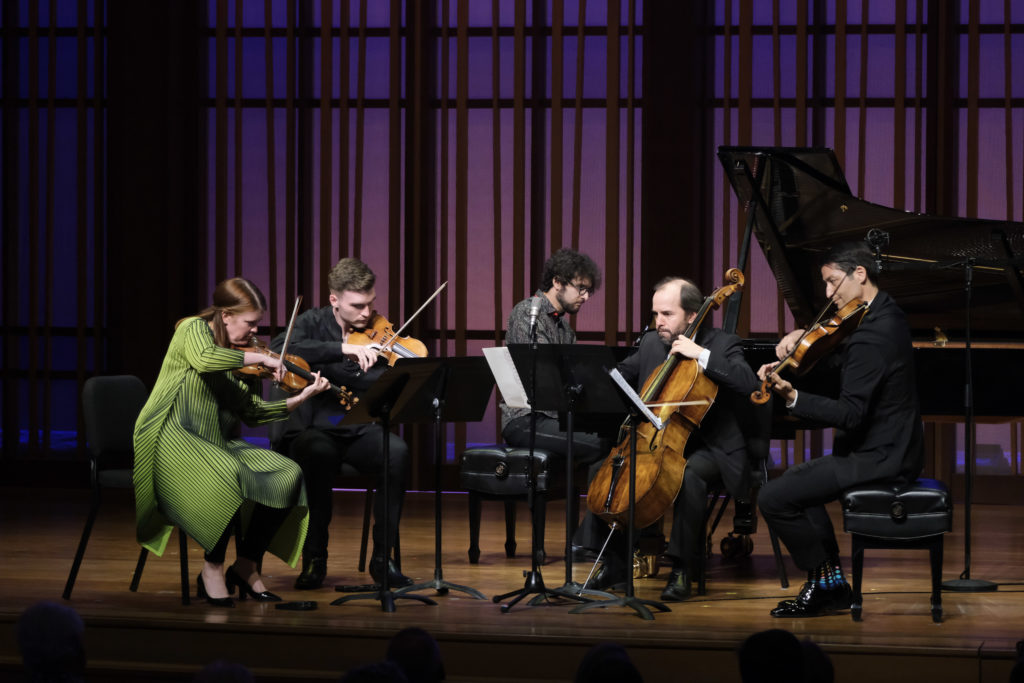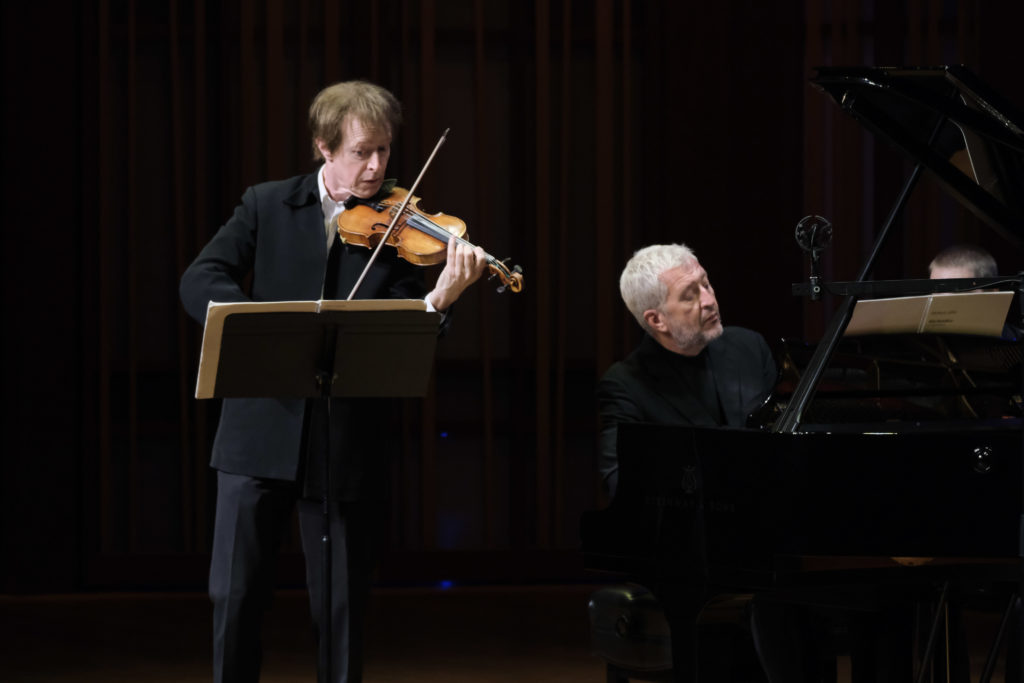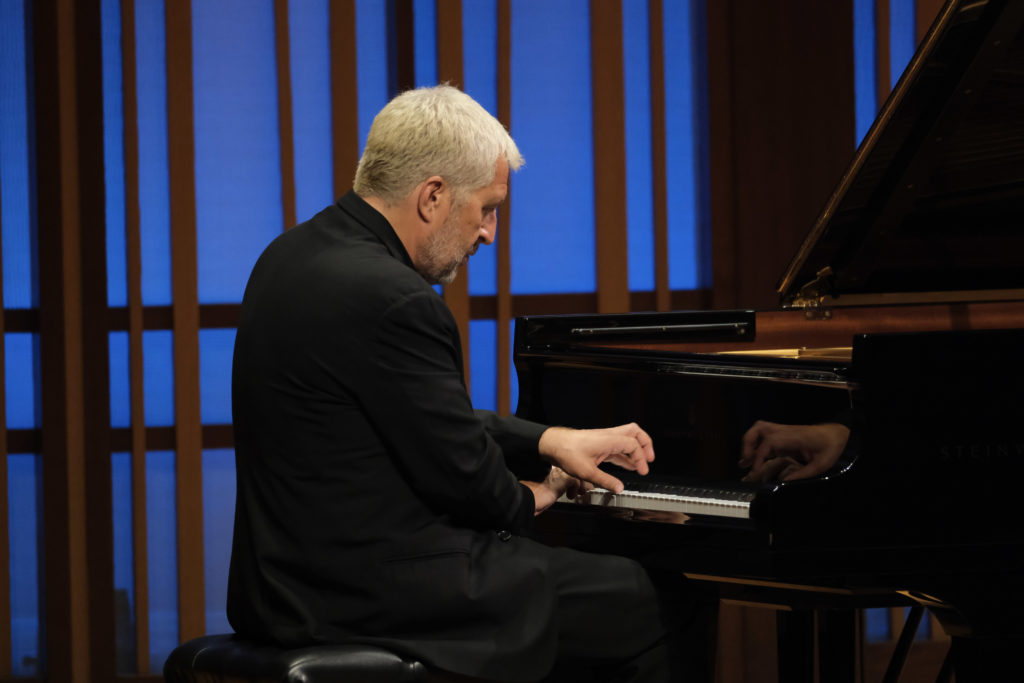La Jolla SummerFest’s ‘Fantastic Tales’ Concert Displays Fantastic Performances
Thomas Adès, the Composer-in-Residence for this season’s SummerFest, made an impressive La Jolla debut Wednesday. With the assistance of violinist Anthony Marwood, the celebrated British composer and pianist not only introduced his 2021 composition Märchentänze (Fairytale Dances), a U.S. premiere of this inventive chamber work, but he also provided a bracing account of the demanding piano solo in Leoš Janáček’s Concertino for Clarinet, Bassoon, Horn, Two Violins, Viola and Piano.
The four movements of Adès’ engaging suite of dances explode with a torrent of vivacious ostinatos that favor the high registers of both violin and piano. The composer’s thematic complexities reminded me of Boulez’s postwar piano works, but without forsaking the structural advantages of tonal harmony. The suite’s third dance provides a daunting solo flight for the violin, which Marwood executed with enviable confidence, although the piano plays a single note in the dance’s penultimate measure. Very dry humor, to be sure. The suite’s finale offers a jubilant combat between the instruments, which the performers appeared to relish.Janáček’s Concertino deserves to be as well-known as the Robert Schumann Quintet for Piano and Strings in E-flat Major that closed this SummerFest concert. Although the Concertino has been around for nearly a century, it remains a concert hall rarity. Filled with the Czech composer’s witty, angular motifs, its four movements recount a program filled with cute forest creatures similar to those championed in the composer’s opera The Cunning Little Vixen. But Janáček’s musical structures enchant even without knowing a shred of his program.
Horn virtuoso Stefan Dohr matched Adès’ commanding keyboard articulation and dramatic flair in the work’s opening movement, a delightfully assertive duet for these two instruments. The second movement replaces the horn with an E-flat clarinet, giving clarinetist Mark Simpson the opportunity to challenge the piano with dazzling motifs and themes that evoke the spirit of period klezmer music.A stirring con moto designation encourages the full ensemble to rattle the rafters in the third movement, although this raucous fun subsides just long enough to give the piano space for a saucy cadenza, which Adès indulged with elan. The tempo relaxes a bit in the finale, with the piano boldly calling the shots through a string of variations on a theme that sounds rather folkloric.

(l. to r.) Erin Keefe, Alexi Kenney, Roman Rabinovich, Efe Baltacigil & Masumi Per Rostad [photo (c.) Ken Jacques]
Anyone looking for evidence of the composer’s oft discussed bipolar tendencies should examine the Piano Quintet’s march-like second movement with its unexpected contrasting episodes. Rabinovich and his colleagues handled these mood swings quite comfortably. Although the Scherzo’s calling card is a series of furious octaves in every range, when the composer takes a break from his rigorous calisthenics, violinists Erin Keefe and Alexi Kenney eagerly took the opportunity to display their most dulcet, ingratiating timbres.
The breadth and nobility of the Piano Quintet’s final movement is arguably the ideal finale for a chamber concert: triumphant themes that dispel all of the Sturm und Drang of earlier movements and a bold closing fugue that unites a major theme from the opening movement with a counter-subject from the finale. This is Robert Schumann in his most optimistic frame of mind, and these players made the finale a welcome benediction.
Rabinovich and Baltacigil opened this concert with Robert Schumann’s Fantasiestücke, Op. 73, a set of three short pieces originally written for clarinet and piano. Unfortunately, Rabinovich’s suave, stylish interpretation of the piano score too easily overpowered Baltacigil’s solo lines. Perhaps the cellist sensed a just balance of the instruments on stage, but out in the room it was difficult to follow his musical line.
This concert was presented by the La Jolla Music Society in La Jolla’s Conrad Prebys Performing Arts Center on Wednesday, August 2, 2023. The La Jolla SummerFest continues in this venue through August 26, 2023.

Ken Herman, a classically trained pianist and organist, has covered music for the San Diego Union, the Los Angeles Times’ San Diego Edition, and for sandiego.com. He has won numerous awards, including first place for Live Performance and Opera Reviews in the 2017, the 2018, and the 2019 Excellence in Journalism Awards competition held by the San Diego Press Club. A Chicago native, he came to San Diego to pursue a graduate degree and stayed.Read more…


